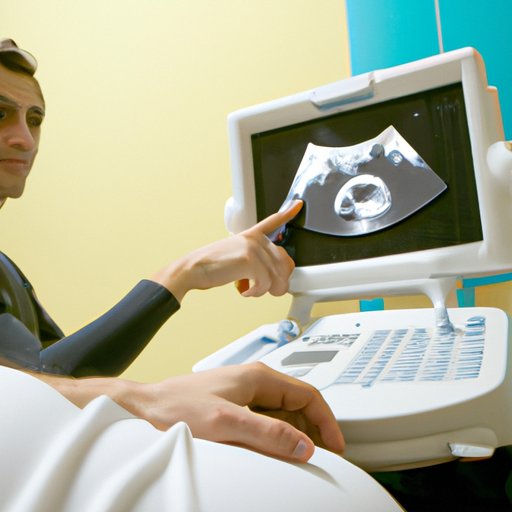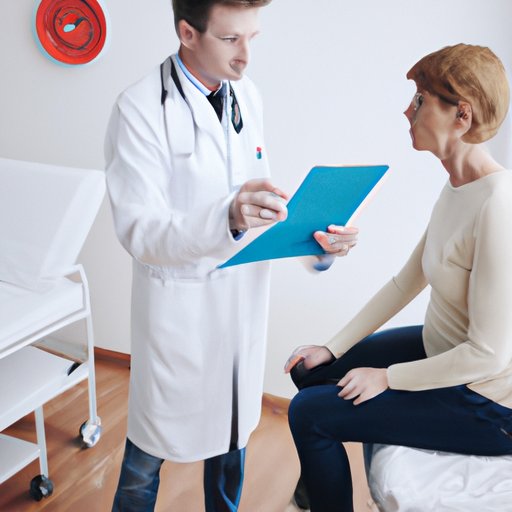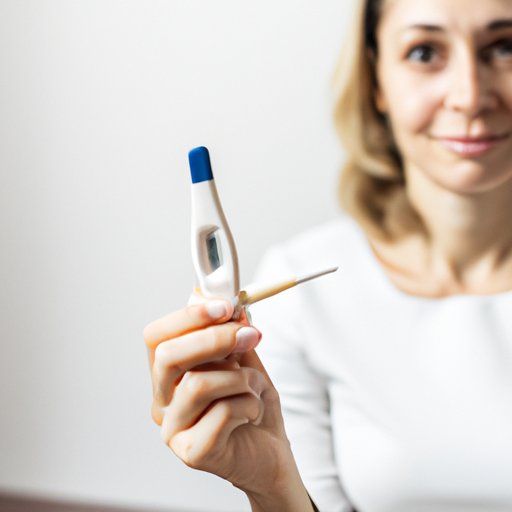Introduction
Being pregnant can be both exciting and overwhelming, especially when it comes to determining how far along you are. Knowing how far along you are in your pregnancy is important for understanding the stages of development and changes your body will go through during this time. Fortunately, there are several ways to accurately assess how far along you are.

Identifying Common Early Pregnancy Symptoms
One of the most common and earliest signs of pregnancy is morning sickness. This can include nausea, vomiting, and food cravings. Fatigue is also a very common symptom of early pregnancy, since your body is working extra hard to support your growing baby. Additionally, many women experience breast tenderness, which can range from mild discomfort to severe pain. Lastly, some women may notice an increase in weight gain as they progress through their pregnancy.
Using a Home Pregnancy Test to Determine How Far Along You Are
Home pregnancy tests are a convenient and cost-effective way to determine if you are pregnant. Most home tests use a urine sample to detect the presence of the hormone hCG in your body. If the test reads “positive,” then you are likely pregnant. It’s important to pay attention to the instructions on the package, as some tests have specific directions for reading the results.
It’s important to keep in mind that home pregnancy tests aren’t always 100% accurate. False positives or false negatives can occur if the test isn’t used correctly. Additionally, if you take the test too early, it may not be able to detect the hormone hCG, resulting in a false negative.

Utilizing Ultrasound Imaging to Estimate How Far Along You Are
Ultrasound imaging is another way to determine how far along you are in your pregnancy. During an ultrasound, sound waves are used to create an image of the baby, placenta, and uterus. This allows your doctor to measure the size of the baby, which can help them estimate how far along you are. Additionally, the doctor can look for other signs, such as the baby’s heartbeat, to confirm the estimated gestational age.
Keep in mind that ultrasound imaging isn’t always 100% accurate. Factors such as the position of the baby, the amount of amniotic fluid, and the mother’s body shape can all affect the accuracy of the ultrasound image.
Tracking Your Menstrual Cycle to Estimate How Far Along You Are
The length of your menstrual cycle is another way to estimate how far along you are in your pregnancy. The average menstrual cycle is 28 days long, but this can vary from woman to woman. To track your menstrual cycle, it’s important to keep track of the first day of your last period. You can then count the number of days until your next period begins to get an idea of the length of your cycle.
Once you know the length of your menstrual cycle, you can use this information to estimate how far along you are in your pregnancy. For example, if your cycle is 28 days long, then you would be four weeks pregnant after 28 days of your last period.

Talking to Your Doctor to Get an Accurate Assessment of How Far Along You Are
If you are unsure of how far along you are, it’s best to talk to your doctor. They will be able to ask you questions about your health history and symptoms and perform tests to get an accurate assessment of how far along you are. Depending on your situation, your doctor may order a blood test, urine test, or ultrasound to determine how far along you are.
In addition to these tests, your doctor may also ask you questions about your menstrual cycle and any symptoms you may be experiencing. Answering these questions honestly can help your doctor get a better understanding of your overall health and the stage of your pregnancy.
Conclusion
Determining how far along you are in your pregnancy is important for understanding the stages of development and changes your body will go through. Common early pregnancy symptoms, such as morning sickness, fatigue, breast tenderness, and weight gain can help you identify if you are pregnant. Home pregnancy tests, ultrasound imaging, and tracking your menstrual cycle can help you estimate how far along you are. However, talking to your doctor is the best way to get an accurate assessment of how far along you are.
(Note: Is this article not meeting your expectations? Do you have knowledge or insights to share? Unlock new opportunities and expand your reach by joining our authors team. Click Registration to join us and share your expertise with our readers.)
